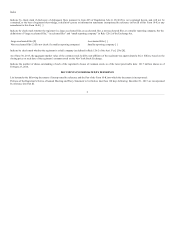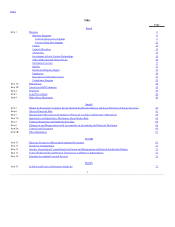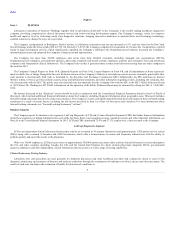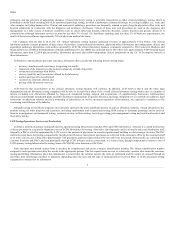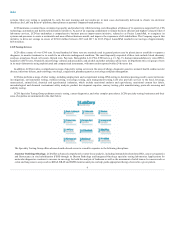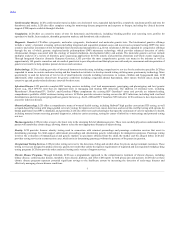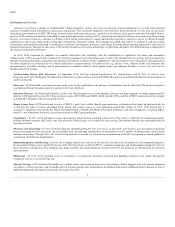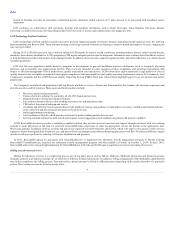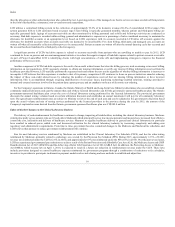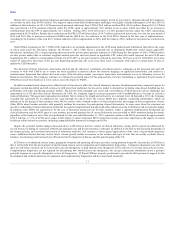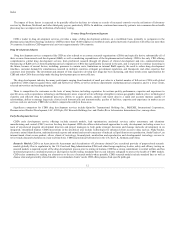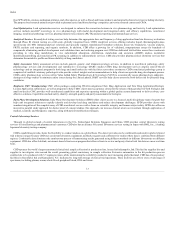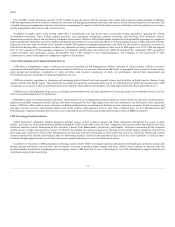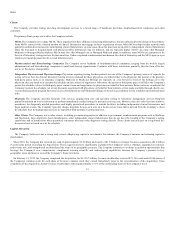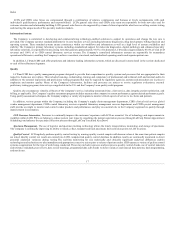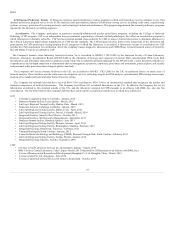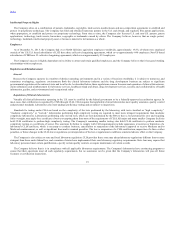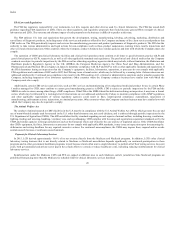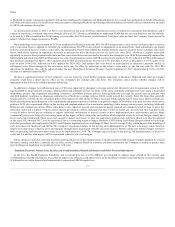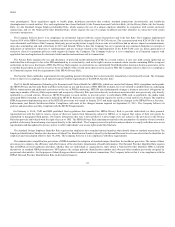LabCorp 2015 Annual Report Download - page 12
Download and view the complete annual report
Please find page 12 of the 2015 LabCorp annual report below. You can navigate through the pages in the report by either clicking on the pages listed below, or by using the keyword search tool below to find specific information within the annual report.
Index
The impact of these factors is expected to be partially offset by declines in volume as a result of increased controls over the utilization of laboratory
services by Medicare, Medicaid, and other third-party payers, particularly MCOs. In addition, continued movement by patients into consumer driven health
plans may have an impact on the utilization of laboratory testing.
CDD, a leader in drug development services, provides a range of drug development solutions on a worldwide basis, primarily to companies in the
pharmaceutical and biotechnology industries. CDD has more than 14,000 employees worldwide and a global network of operations with offices in more than
30 countries. In addition, CDD supports trial activity in approximately 100 countries.
Drug development services companies like CDD are also referred to as contract research organizations (CROs) and typically derive substantially all of
their revenue from research and development (R&D) as well as marketing expenditures of the biopharmaceutical industry. CDD is the only CRO offering
comprehensive global drug development services from preclinical research through all phases of clinical development and into commercialization.
Outsourcing of R&D services from biopharmaceutical companies to CROs has significantly increased in the past, and is expected to continue increasing in
the future, because of several factors, including: pressures to contain costs, limitations on internal R&D capacity, the need to reduce drug development
timelines, customer demand for simultaneous research in multiple countries, stringent government regulation, and therapeutic and other expertise that
customers lack internally. The investment and amount of time required to develop new drugs has been increasing, and these trends create opportunities for
CDD and other CROs that can help make the drug development process more efficient.
The drug development industry has many participants ranging from hundreds of small providers to a limited number of full-service CROs with global
capabilities. CDD competes against these small and full-service CROs, as well as in-house departments of pharmaceutical companies, and to a lesser extent,
selected universities and teaching hospitals.
There is competition for customers on the basis of many factors, including: reputation for on-time quality performance; expertise and experience in
specific areas, such as operations, technology, and therapeutic areas; scope of service offerings; strengths in various geographic markets; price; technological
expertise and efficient drug development processes; ability to acquire, process, analyze and report data in a rapid and accurate manner; quality of
relationships; ability to manage large-scale clinical trials domestically and internationally; quality of facilities; expertise and experience in market access
services; and size and scale. CDD believes that it competes favorably in these areas.
Significant competitors for CDD's drug development services include Quintiles Transnational Holdings Inc., PAREXEL International Corporation,
Pharmaceutical Product Development, LLC, ICON plc, INC Research Holdings, Inc. and Charles River Laboratories International, Inc., among others.
CDD’s early development service offerings include research models, lead optimization, analytical services, safety assessment, and chemistry
manufacturing and control (CMC) services for drug development. CDD also offers solution-based approaches to early development, including access to a
team of experienced program development directors and project managers to help guide strategic decisions and manage molecule development in an
integrated, streamlined manner. CDD's innovations in the preclinical area include technologies for enhanced client access to data, such as: StudyTracker,
electronic animal identification, multimedia study reports and animal and test tube measures of induced cell proliferation or reproduction. StudyTracker®, an
internet-based client access product, allows clients of toxicology, bioanalytical, metabolism and reproductive and developmental toxicology services to
review study data and schedules on a near real-time basis. CDD has preclinical laboratories in the U.S., the U.K., Germany and China.
CDD is an Association for Assessment and Accreditation of Laboratory Animal Care accredited provider of purpose-bred research
models globally. Due to regulation by the U.S. Food and Drug Administration (FDA) and other foreign regulatory bodies, safety and efficacy testing on
research models is required as part of the drug development process prior to testing in humans. CDD has a strong commitment to animal welfare, and has
instituted progressive enrichment practices and rigorous health testing standards that exceed industry safeguard to protect the health of CDD's models.
CDD is also committed to seeking out alternatives to the use of research models where possible. CDD's research models include standard lines as well as
disease state and genetically altered models to accommodate clients’ needs. CDD offers purpose-bred specific pathogen
12


